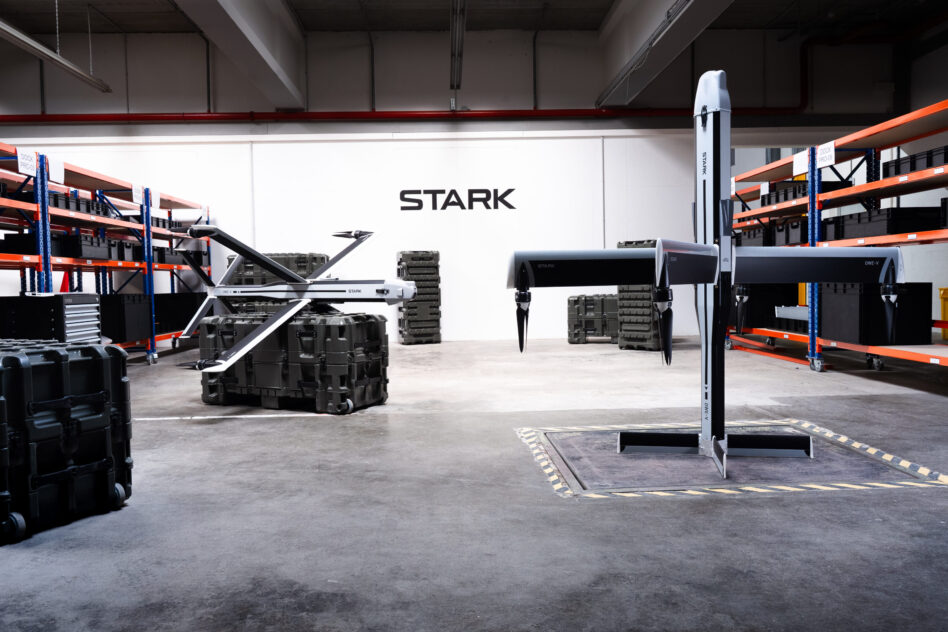It’s been a big week for Stark. Last Wednesday, the German drone company announced that it’s opening a 40,000 sq ft manufacturing facility in the UK, the company’s first site outside of Germany and Ukraine.
Plus, the company announced that it’s acquiring Berlin-based autonomous flight control start-up Pleno, which specializes in comms-denied navigation for low-cost drones.
Philip Lockwood, managing director and SVP of strategy for Stark International, told Tectonic that his company is eyeing broader expansion across Europe. “Our ambitions are to expand as quickly as possible,” he said, “Obviously, when you look at where things are at with Europe right now, I don’t think that we have a moment to lose.”
On the battlefield: Stark was founded in 2024 in Berlin by Florian Seibel, co-founder and CEO of Quantum Systems. (Seibel has stepped away from Stark’s day-to-day operations since.)
The main idea was to build drones and autonomous systems for European and NATO partners that could be produced at scale to meet immediate operational needs—like those on the battlefield in Ukraine. (Lockwood told Tectonic that Stark maintains an office in Kyiv and works closely with Ukrainian military partners.)
So far, the company has publicly unveiled two products:
- Virtus: A VTOL one-way attack drone that can carry a 5kg (11lb) payload and dive at up to 250 km/h (155 mph). The drone is modular and can be quickly modified.
- Minerva: The company’s bespoke Command and Weapons Control (CWC) system, giving operators the ability to control swarms of unmanned systems.
And it seems the pitch is working: Last fall, Sequoia Capital invested €14M ($16.32M) in Stark and, in April, Peter Thiel reportedly tacked on a $15M angel investment, according to Pitchbook.
Allied response: Like much of what Stark has done, Lockwood told Tectonic that the launch of the UK production facility in Swindon is closely tied to geopolitical shifts in Europe.
“German and UK relations have…changed,” he said, “There’s a recognition that these two countries in particular need to step up and play an even greater leadership role when it comes to the defense and security here in Europe.”
- Last fall, the two countries signed the Trinity House Agreement on Defence, enhancing military cooperation.
- Then, last week, Germany and the UK signed a bilateral defense treaty—the first since WWII.
- The UK also runs Taskforce Kindred, which supplies weapons directly to Ukraine.
Plus, there’s all the work the UK is doing to increase defense innovation and fund new tech, Lockwood said. (Remember the SDR?) “We see where the UK is going in terms of defense spending, and how the UK is improving and growing their ambitions when it comes to unmanned systems and defense,” he added, “So it’s been a market that we’ve been really interested in for some time.”
To start, much of the manufacturing out of Swindon will focus on Virtus, though Lockwood couldn’t reveal how many drones they’d be churning out. But he did say they’re working on a range of unmanned systems with different capabilities (strike and non-strike), plus other solutions that fit into the broader mandate of “software defined warfare.”
And after Swindon, the idea is to build production facilities throughout Europe. Not only does this mean more drones, but it also means a more distributed and secure supply chain should any one facility be struck or go offline, Lockwood said.
“As STARK, as we grow and expand and develop more production sites and continue to work on our products, we want to be part of securing Europe for the long term,” he added.
Going offline: This brings us to the matter of Pleno. Though Stark produces its own software (Minerva), Pleno’s navigation stack is specifically designed for comms and GNSS-denied environments (cough, Ukraine, cough).
- The company was originally founded as a climate tech startup, focused on automated carbon measurement.
- The firm pivoted to defense tech last year and has built two drone autonomy and simulation tools: PLENO Sim and PLENO Lab.
The two companies plan to integrate Pleno’s stack onto Stark’s products, including Virtus, which should improve performance in places—like the frontlines of Ukraine—where jamming is rampant.
The two companies did not reveal details of the deal, but Pleno’s co-CEO and co-founder Nino Lindenberg will be joining Stark as director of Al and navigation.

